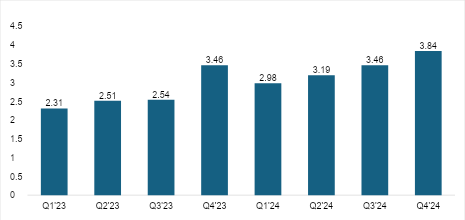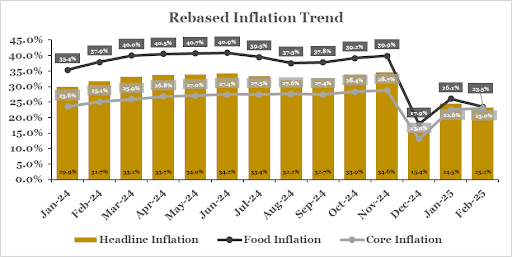Nigerian Economy Sustains Strong Growth Momentum in Q4 2024

Nigerian Economy Sustains Strong Growth Momentum in Q4 2024 The Nigerian economy sustained its growth momentum in the fourth quarter of 2024, expanding by 3.84%. This marks an improvement from the 3.46% growth recorded in Q3 2024 and Q4 2023. As a result, Nigeria’s GDP growth for 2024 stands at 3.4%, a notable rise from 2.74% in 2023. This continued positive trajectory signals the Nigerian economy’s resilience and ability to sustain growth amidst external and internal challenges. The growth in Q4 2024 was primarily driven by a surge in aggregate demand, which typically spikes during the festive period. Furthermore, agricultural output benefitted from the harvest season, contributing significantly to economic growth. The agricultural sector grew by 1.76% in Q4 2024, compared to 1.14% in Q3 2024, primarily driven by improved performance in crop production. The reduction in Premium Motor Spirit (PMS) prices also played a significant role in driving economic growth. A decline in Brent crude prices and the commencement of operations at the Dangote refinery, along with other refineries like Old PH and Warri, helped lower transportation and operational costs for both consumers and businesses. 25 activities expanded, 15 slowed and 6 contracted The fourth quarter of 2024 also saw continued progress in Nigeria’s major sectors. Notably, 25 activities expanded, 15 slowed, and 6 contracted, indicating positive economic developments. This marks an improvement compared to the third quarter of 2024, when more sectors contracted (22 Expanded, 14 Slowed and 10 Contracted). The Central Bank’s efforts to stabilize the Naira appear to be paying off, particularly in the real sector, with evidence suggesting that the Nigerian economy is more sensitive to exchange rates than interest rates. Moreover, the decline in PMS prices is having a noticeable effect on the transportation sector, which grew by 18.61%, a significant jump from the 12.15% growth seen in Q3 2024. Below is a breakdown of key sectors/activities that expanded, slowed or contracted: Expanding sectors/Activities Q3’24 Q4’24 Comments Agriculture 1.14 1.76 Supported by a robust harvest and a relative decline in logistics costs Manufacturing 0.921 1.79 Largely supported by Naira appreciation and improved oil refining activities at the Dangote refinery as well as the commencement of operation at the old PH and Warri refineries Trade 0.65 1.19 Supported by Naira appreciation and a gradual boost in disposable income as some states have implemented the new minimum wage Construction 2.91 2.95 Improved construction activities, evidenced by the growth in cement manufacturing Real estate 0.68 0.86 Increased real estate construction activities Transport and Storage 12.15 18.61 Partly due to the gradual decline in PMS prices due to lower global oil prices Slowing & Contracting Sectors/Activities Q3’24 Q4’24 Comments Crude petroleum and natural gas 5.171 1.48 Decline in crude oil production Financial and Insurance 30.83 27.78 Though the sector slowed, the growth rate is still high as the high interest rates support interest income. Meanwhile, the relative stability in the exchange rate means that FX gains could begin to thin out. Electricity supply 3.23 -5.04 This was partly due to ongoing issues with the national grid, including consistent grid collapses. Coal mining -63.56 -121.33 Partly due to security, operational and infrastructural challenges. Also, inadequate funding and challenges are other key challenges. GDP Outlook Looking ahead, Nigeria’s GDP growth outlook appears cautiously optimistic, with several factors that could foster a favorable economic environment. As inflation continues to moderate, there is a strong possibility that the Central Bank of Nigeria (CBN) may opt for a shift towards monetary easing in the second half of the year. This would likely result in lower interest rates, which in turn would reduce financing costs for businesses, encouraging expansion and investment. A more favorable monetary policy environment would make credit more accessible and affordable, which could fuel growth in both the corporate and SME sectors. Additionally, the implementation of a new minimum wage policy is expected to positively impact consumer purchasing power. As wages rise, the disposable income of workers will increase, which is expected to stimulate domestic demand. This, in turn, will likely have a positive effect on retail consumption, as well as boost business revenues across various sectors. With the ongoing disinflation process, the combination of higher wages and more stable prices will help to restore confidence in the economy and foster a more vibrant consumer market. However, while these developments paint an optimistic picture, there are still potential risks that could derail the economic outlook. One significant risk is the ongoing global trade uncertainties, particularly the potential for tariffs and restrictive trade policies from major global economies. For example, any shifts in the trade policies of the United States, under President Donald Trump or subsequent administrations, could have significant ripple effects on Nigeria’s economy. Tariffs and import restrictions could hinder the growth of Nigeria’s export sectors, such as oil and agricultural products, while also increasing the cost of imported goods. Furthermore, the potential tightening of immigration policies in key economies could impact the remittance flows to Nigeria. Remittances from Nigerians working abroad are a critical source of foreign exchange and a key contributor to household income for many families in Nigeria. Any restrictions on immigration or changes to work visa policies in countries like the United States could reduce the number of Nigerians able to send money back home, negatively affecting domestic consumption and economic stability.
Nigeria’s Headline Inflation Decelerates to 23.18% in February

Nigeria’s Headline Inflation Decelerates to 23.18% in February The Consumer Price Index (CPI) and inflation data for February, released yesterday, revealed a notable moderation in headline inflation, which decreased to 23.18%, down from 24.48% in January. This deceleration was primarily driven by a significant reduction in food inflation. According to the National Bureau of Statistics (NBS), food inflation fell by 2.57%, dropping to 23.51% in February from 26.08% in January. This decline was largely anticipated, given the seasonal effects of the harvest period and a reduction in logistics costs, which benefited from the pass-through impact of lower energy prices during the month. Additionally, the relative stability of the exchange rate in February helped ease inflationary pressures on imported food items, even as consumption demand remained subdued due to broader economic challenges. In contrast, core inflation, which excludes volatile food and energy components, showed a slight increase, rising to 23.01% from 22.60% in January. The uptick in core inflation highlights that underlying inflationary pressures persist, indicating that inflation risks remain embedded in the economy. This suggests that while the decline in food inflation provides some temporary relief, inflationary expectations continue to be driven by structural factors, including supply chain constraints and persistent cost pressures in non-food sectors. Policymakers will continue to monitor these trends closely, as they weigh the implications for monetary policy and broader economic stability. Is the Downward Trend in Inflation Sustainable in the Coming Months? The inflationary trajectory in the coming months will be influenced by multiple factors. The anticipated increase in demand due to the Ramadan and Easter festivities is likely to temporarily boost consumer spending, particularly in the food and transportation sectors. Furthermore, the recent suspension of the Naira-for-crude arrangement between Dangote Refinery and the NNPCL, if not reinstated, may lead to significant currency pressures as the refinery would need to source foreign exchange to procure crude oil. Additionally, the onset of the planting season in the second quarter is expected to reduce the supply of certain commodities, potentially pushing prices higher. We expect the monetary authorities to closely monitor these developments and the evolving inflation data, as they will play a crucial role in shaping policy decisions at the next meeting in May.
Parthian Capital Limited Increases Investment Opportunities with Two New Investment Funds

Parthian Capital Limited Expands Investment Opportunities with Two New Investment Funds Parthian Capital Limited, the asset management division of the Parthian Group, proudly announces the launch of two investment funds: the Parthian Money Market Fund and the Parthian Dollar Fixed Income Fund. These new offerings are designed to provide investors with secure and customised financial solutions, fostering long-term wealth preservation and growth. During the launch event, Group Managing Director, Oluseye Olusoga underscored the crucial role of the capital market in Nigeria’s economic development. “The capital market is the backbone of Nigeria’s economy,” he stated. “Our new funds are engineered to create long-term value and protect wealth for a diverse range of investors, retail, high-net-worth, and institutional alike. With these funds, we are providing the financial tools that will drive sustainable growth.” L-R: Olufemi Shobanjo, CEO, NGX Regulation; Olufunke Aiyepola, MD/CEO, UTL Trust Management; Abiodun Adebimpe, West Africa Regional Head, Custodial Services, Rand Merchant Bank; John Briggs, Lagos Head, Securities and Exchange Commission (SEC); Adedotun Sulaiman, MFR, Chairman, Parthian Partners; Ndidi Ukaonu, Director, Parthian Group; Ibilola Ashcroft, MD Designate, Parthian Capital; Oluseye Olusoga, Group MD/CEO, Parthian Group; Regina Asala, Rand Merchant Bank; Omowonuola Kunle-Bello, Head, Fund & Investment Manager Ratings, Agusto & Co; Benard Esan, Rep. of Company Secretary, Alsec Nominees; Oyindamola Ehiwere, CEO, Alsec Nominees. The Chairman of Parthian Group, Adedotun Sulaiman also emphasised the essential role of investments in economic development, stating, “Capital is the oxygen of the economy, and without capital, we can’t go very far.” Acting Managing Director of Parthian Capital Limited, Ms. Ibilola Ashcroft, expressed excitement about the new offerings. “We are thrilled to introduce our investment funds to the market,” she said. “Each fund is meticulously structured to provide secure, dependable, and diversified investment solutions that align with our clients’ financial aspirations.” Ashcroft further noted, “The Parthian Money Market Fund is designed to offer competitive returns while minimizing risk, allowing investors to optimise their portfolios without compromising on safety. Our team is dedicated to delivering personalised strategies that empower our clients to reach their financial goals.” L-R: Olufunke Aiyepola, MD/CEO, UTL Trust Management; Abiodun Adebimpe, West Africa Regional Head, Custodial Services, Rand Merchant Bank; Adedotun Sulaiman, MFR, Chairman, Parthian Partners; Ndidi Ukaonu, Director, Parthian Group; Ibilola Ashcroft, MD Designate, Parthian Capital; Oluseye Olusoga, Group MD/CEO, Parthian Group; Regina Asala, Rand Merchant Bank; Omowonuola Kunle-Bello, Head, Fund & Investment Manager Ratings, Agusto & Co The Parthian Money Market Fund is a low-risk, open-ended investment vehicle focused on capital preservation and steady income generation. It offers investors a secure way to manage cash through diversified investments in short-term money market instruments. Meanwhile, the Parthian Dollar Fixed Income Fund enables investors to diversify their portfolios with dollar-denominated securities, serving as an effective hedge against Naira depreciation while providing attractive returns. The formal launch event brought together key stakeholders, investors, and industry leaders to celebrate this milestone and gain insights into Parthian Capital’s innovative approach to wealth management. For more information about these investment funds and to explore detailed product information, please visit www.parthiancapitalng.com. L-R: Adedotun Sulaiman, MFR, Chairman, Parthian Partners; Ndidi Ukaonu, Director, Parthian Group; Ibilola Ashcroft, MD Designate, Parthian Capital; Oluseye Olusoga, Group MD/CEO, Parthian Group About Parthian Capital LimitedParthian Capital Limited is a leading asset management firm in Nigeria, offering tailored investment solutions to individuals and institutions. As part of the Parthian Group, the company is committed to driving financial inclusion and economic growth through innovative products and services.


